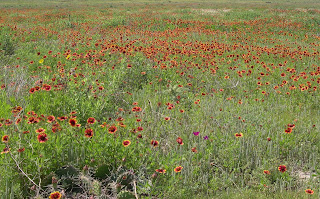I know what she means in a way that goes beyond words, a way of knowing that rises from my cells. Writing is how I recognize myself - and how I know myself as human. It's how I see myself in the context of others. It's how I recognize my relationship with the rest of the living world, what my Crow Indian friends Rose Plenty Good and Alice Bulltail used to call "all our relations." Meaning not just all the other human beings, but all the other species, those lives we share this planet with. Even the ones we fear or hate or don't know. Perhaps especially those.
Rose and Alice and the other women who gathered in my neighbor Terry's living room to drink coffee and bead and tell stories weren't a judgmental lot, but they didn't mince words when someone was selfish or greedy or mean or cruel or in some way violating the community. "He acts like he has no relatives," they'd say. It was their worst insult: to act as if you alone were the most important, as if the whole world was about you.
 Watching how we have been behaving lately - whether we're killing each other in Iraq and Lebanon and Darfur, or killing other species as we rush to consume more than our share of the worlds' resources first, that's the phrase that comes to mind: we're acting as if we have no relatives. As if it really was all about us.
Watching how we have been behaving lately - whether we're killing each other in Iraq and Lebanon and Darfur, or killing other species as we rush to consume more than our share of the worlds' resources first, that's the phrase that comes to mind: we're acting as if we have no relatives. As if it really was all about us.It's not. It seems to me that the "little" wars flaring around the world and global climate change are all saying the same thing: our actions, big and small, subtle and obvious, day in and day out, all have lasting consequences. Who we love, who we hate, who we trust. It's whether we are careful with the resources we use in our everyday lives: Do we buy more than we need? Do we leave the water faucet running? Do we turn lights off? Is our approach to the world kind and tolerant, or suspicious, greedy and fearful?
Let's start behaving like relatives again. Let's treat each other - and all those other swimming, crawling, flying, and rooted lives - as if we were kin. Let's make space for each other and be courteous and don't hog the last cookies - or oil - just because we can. Let's use our art and our lives to recognize ourselves as the people we can be, not the people who behave as if we have no relations. That's not us. We can do better, and the sooner we start, the more likely we'll still have a world to share - and share alike.






No comments:
Post a Comment